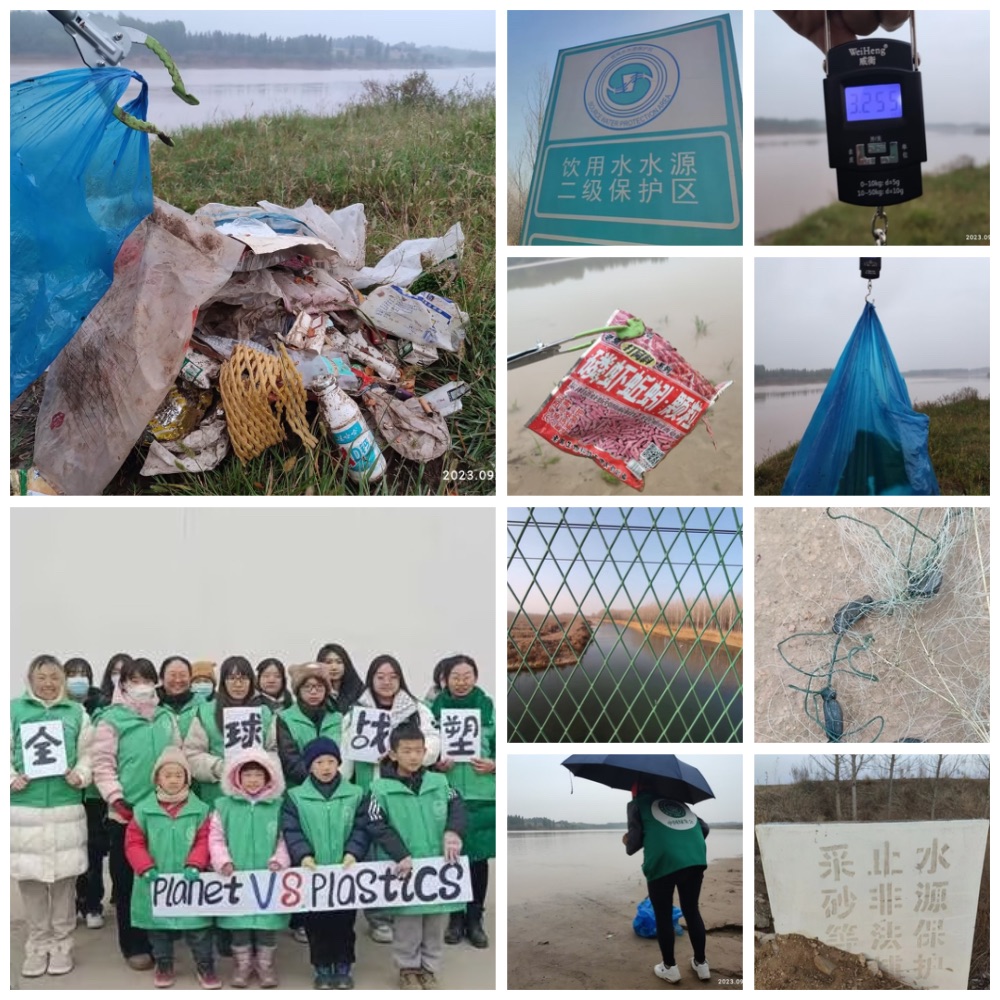Progress report for
Reduce and Pick-up Plastics to Reduce Marine Pollution

Achievement at a glance
Plastic pollution poses a severe threat to watersheds, the lifeblood of our freshwater resources. As plastic debris accumulates in rivers, streams, and lakes, it contaminates drinking water, disrupts aquatic ecosystems, and endangers wildlife. As a new stage of the "Reduce and Pick-up Plastics to Reduce Marine Pollution", the "People vs. Plastics" movement, spearheaded by the Reduce & Pick-up Working Group of the China Biodiversity Conservation and Green Development Foundation (CBCGDF) in September 2023, stands as a testament to the power of collective action in addressing the pressing issue of plastic pollution. This grassroots initiative, driven by the unwavering commitment of communities and ordinary people (including elderlies and youth), has made significant strides in safeguarding watersheds and marine ecosystems, fostering a more harmonious coexistence between humanity and nature.The bottom-up environmental protection initiative that advocates for widespread public participation and social governance to combat plastic pollution, and to safeguard acquatic and marine ecosystem. The project has made significant progress in a short period, with activities spanning 12 cities across China and over 21 events. Plus, it utilises every important dates - including World Wetlands Day, Earth Day, World Water Day, World Wildlife Day... to promote awareness in this regard.
The "People vs. Plastics" movement has taken a resolute stand against this menace, organizing extensive clean-up drives along waterways across China. These efforts have resulted in the removal of substantial quantities of plastic waste, safeguarding freshwater sources and marine eco-system for future generations.
Challenges faced in implementation
Firstly, the relentless surge of plastic waste into our waterways is a pressing environmental crisis that demands immediate and decisive action. The sheer volume and velocity of plastic pollution outpace our current efforts to mitigate its harmful effects. To effectively combat this menace, we must shift the burden of responsibility from overburdened communities and volunteers to the very source of the problem: the producers of plastic products.The current model of plastic production and consumption is unsustainable, generating vast quantities of plastic waste that end up in our oceans, rivers, and lakes. This deluge of plastic debris poses a grave threat to marine ecosystems, entangling and harming marine life, disrupting food chains, and degrading habitats. While community clean-up efforts and individual actions are commendable, they are insufficient to stem the tide of plastic pollution. We must hold producers accountable for the environmental impact of their products. Producer responsibility schemes, where manufacturers are financially and operationally responsible for the end-of-life management of their products, can play a pivotal role in reducing plastic waste.
Secondly, securing adequate funding is crucial for the movement's continued growth and impact. While volunteer efforts form the backbone of the movement, financial resources are essential for supporting infrastructure, expanding operations, and implementing larger-scale initiatives.
Next Steps
Linda WongBeneficiaries
The "People vs. Plastics" movement champions a multifaceted approach to combating plastic pollution, extending its benefits to a diverse range of stakeholders, including local communities, future generations, aquatic / marine ecosystems, wildlife, and the planet as a whole.
Local communities experience enhanced environmental quality, improved public health, and economic gains from cleaner waterways, reduced litter, and healthier ecosystems. Future generations inherit a cleaner planet with preserved natural resources, reduced environmental burdens, and instilled sustainable values. Marine ecosystems witness reduced plastic entanglement and ingestion, improved habitat quality, and enhanced resilience to environmental threats. Wildlife benefits from a safer environment, reduced risk of harm from plastic debris, and healthier ecosystems that support their survival and well-being.
Actions
Actions taken by the "People vs. Plastics" movement to positively impact its beneficiaries:1) Clean-up and Collection Drives:
- Organizing regular clean-ups to remove plastic waste from the environment around water origins, wetlands and beach.
- Initiating community-based clean-up campaigns in heavily polluted areas.
2) Educational Campaigns and Outreach:
- Developing educational materials to raise public awareness about plastic pollution.
- Conducting workshops and seminars to educate individuals about sustainable practices.
- Using media (CBCGDF Media) to spread the message about the movement.
3) Policy Advocacy and Collaboration:
- Advocating for government policies to reduce plastic waste.
- Collaborating with policymakers to develop effective strategies to address plastic pollution.
- Partnering with businesses to encourage sustainable production practices.
4) Volunteer Engagement and Empowerment:
- Creating diverse volunteer opportunities beyond clean-up activities.
- Implementing recognition programs to acknowledge volunteers' contributions.
- Providing regular training and workshops to equip volunteers with the knowledge and skills to effectively carry out their roles. Provide internsihp for college students for plastic policy research;
5) Constantly engagement in the global dialogue to develop a Plastic Treaty.
- CBCGDF has participated UNEA 4, UNEA 5 and UNEA 6; its leaders have joined the Nairobi Group of Friends to Combat Marine Litter and Plastic Pollution in 2020; the Foundation actively participate in INCs (sessions of the Intergovernmental Negotiating Committee to develop an international legally binding instrument on plastic pollution, including in the marine environment).
